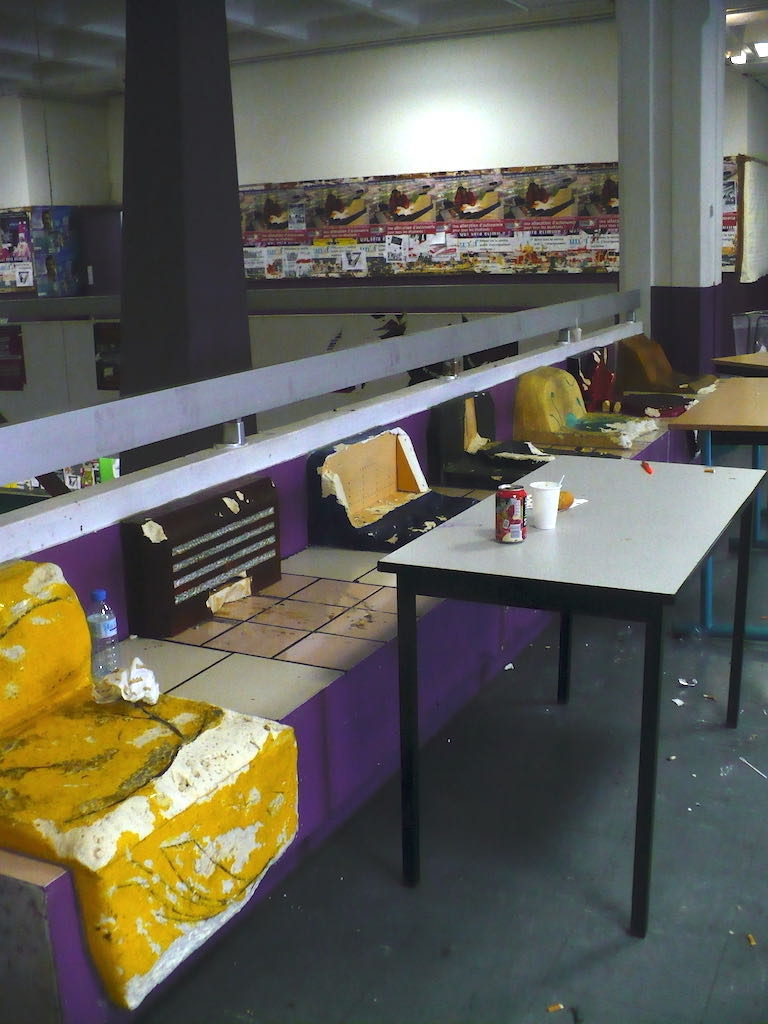The utopian social-democratic politics of the Declaration take on a quite different light when we consider that they were not its original politics. It turns out that that the idea for a Declaration was not originally proposed by the Philosophy Department itself. It had emerged from a more subaltern project called UFR0, the subaltern seminar that we saw in Chapter 4. UFR0 had emerged during the strike against the Sarkozy government’s university reforms. It was led by a charismatic young man, Eric-Olivier, and in theory, it was a critique of the very idea of a discipline. It called itself “a collective project for an experimental, transdisciplinary, critical university, open to all.” The name was a play on the jargon of French university organization. Academic departments in French universities were grouped together into bureaucratic clusters called UFR, Unités de Formation et de Recherche (Teaching and Research Units). These Teaching and Research Units were typically numbered: at Paris 8, for instance, UFR1 was Arts and Philosophy. So “UFR0” was a sort of limit case: a research unit that refused the very system of disciplines. In practice, the work of UFR0 consisted of a series of student-run seminars. Its reach always exceeded its grasp; we saw earlier how it became a space dominated by the male gaze.

Marcel explained to me that the project of a Declaration of Independence had originally been proposed by UFR0:
Marcel: At this point, it’s kind of impossible to know whose head this came from. But if I go back a ways, the first person who I heard say the word “declaration,” it was people from UFR0. One time they came to the Philosophy Department’s general assembly, and after the presentation of the agenda, Eric-Olivier spoke up to say several things, including that, in their view, politically, at that point in time, the crucial thing was to [regenerate] the university. Meaning that they had to be able to simultaneously propose a concept of the university, and possibly even write or edit something on the order of its principles. With which one could identify, be recognized, affirm oneself, be transmitted.
Eli: But what’s funny, is that I saw their own Declaration, and it’s a blank page.
Marcel (laughs): Yeah, as Eric-Olivier’s splendid phrase says, it’s a citation from Socrates.
Eli (laughs): OK… But what is the concrete reference to Socrates, in fact?
Marcel: Well it’s a blank page, right? And Socrates never wrote a single word.
Eli: Oh, yeah, yeah. OK.
Marcel: And so, voilà. Eric-Olivier must have talked about a text that they were going to write. And it was Douailler, who was at the assembly, who would take it up, and who said: That’s a great idea. Let’s do that together. That was in December 2008, as I recall. And so, throughout the winter, in December and January, there were one or two meetings at the Department, at which UFR0 showed up, with Eric-Olivier, and regularly put on the table the idea of a text that would be something like a declaration. And each time, Douailler said, great idea, and Eric-Olivier said, yeah yeah yeah, this has to be done. And Douailler said, no no, it’s not that this has to be done, we are going to do this. So in fact, seeing that UFR0 wasn’t putting any work into it, Douailler took their idea. And they started to write this text, with Eric Lecerf and Marie [Cuillerai], all three of them.
The writing process itself, according to Marcel, had mainly involved long debates about what to put in the articles. The Preamble had been written largely by doctoral students, spearheaded by Ishmael. Meanwhile, the professors had written much of the body of the text. Once a draft was written, the authors circulated it for feedback and had the text translated into Arabic, English, Haitian Creole, Greek, Spanish and Portuguese. This process apparently felt fairly successful; its participants seemed proud of their work. No one was surprised, as far as I could tell, that this utopian project was much too radical to have any real-world impact on French policy debates. I suspect that its aesthetic attraction derived precisely from its practical infeasibility. That, indeed, was precisely what made it utopian.
But what is analytically interesting, nevertheless, is that one marginal utopian project turns out to have been premised on a certain disciplining of an even more marginal utopian project: the UFR0 proposal to declare independence through a blank page. I gathered that Eric-Olivier’s proposal to present the blank page as a Declaration of Independence had also involved some sort of Derridean argument about the signification of blankness and margins. But it seemed clear that this proposal had been deemed too cryptic — too unseriousness in its fringe utopianism, perhaps — to merit official support from the Philosophy Department.
It seems, then, that there was some practical and rhetorical calibration implicit even within this seemingly totally impractical text: as if the implicit maxim were, demand the impossible, but demand it appropriately. The accompanying practices of utopian etiquette, discipline and respectability, however, seem less paradoxical when we remind ourselves that the aim of this Declaration was less to oppose normativity tout court than to renegotiate its terms, aiming to constitute a set of counter-norms and an alternative, but habitable world. Radicalism was permissible, but its bounds were policed.